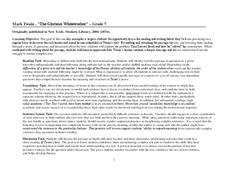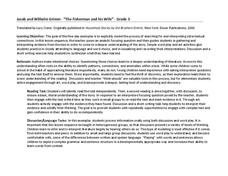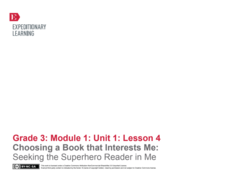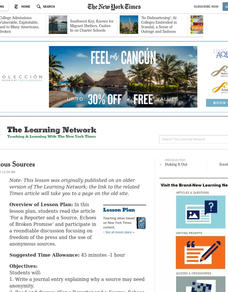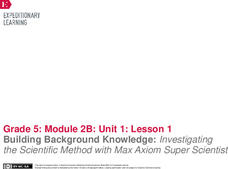Curated OER
The Glorious Whitewasher
Young readers can be exposed to the literary works of Mark Twain as they interact with challenging text and gain experience by reading the complex passages of chapter two "The Glorious Whitewasher" from his famous book, The Adventures of...
Curated OER
The Fisherman and His Wife
Engage conversation and explore the journey as you challenge young readers to interpret the german folktale, "The Fisherman and His Wife" written by literary brothers Jacob and Wilhelm Grimm.
Student Handouts
Think-Pair-Share
Ever ask students to share their thoughts with a partner, but then hear them only talking about their weekend plans? Nip that common classroom practice in the bud with this worksheet, in which class members log the content of their...
Visa
Making it Work Together: Money and Roommates
Balancing money and first-time roommates can feel like a daunting prospect. Support your class members in understanding how financial agreements between roommates function, as well as the underlying importance of how to communicate about...
EngageNY
Science Talk: How do Bullfrogs Survive
Following the reading of the book Bullfrog at Magnolia Circle, the ninth lesson in this unit involves emerging experts in a science talk about how bullfrogs survive. Looking back through the text, young scholars prepare for the...
EngageNY
Choosing a Book That Interests Me: Seeking the Superhero Reader in Me
Selecting a "power book" and engaging in a structured class discussion are the learning targets for this fourth lesson in a larger unit. It is designed as a beginning of the year unit for establishing norms and routines in the classroom....
Curated OER
Shame on You!
Should public humiliation be an acceptable consequence for a crime? Have your middle schoolers engage in a round table discussion about the recent resurgence of the use of public humiliation as a punishment for crimes in the United...
Curated OER
Anonymous Sources in the Media
When do people ask for anonymity? Why? After reading the New York Times article "For a Reporter and a Source, Echoes of Broken Promise," young readers participate in a roundtable discussion focusing on freedom of the press and the use of...
Curated OER
Good for Goodness Sake?
After discussing their opinions of performing community service, young learners read an article about different benefits of serving the community. They participate in a debate about whether their school should require pupils to perform...
Curated OER
The First (and Last) Words
What does "freedom of speech" mean to your class, especially in the context of Internet communications? In round-table discussion format, middle and high schoolers address the issues discussed in "State Legislatures Across U.S. Plan to...
British Council
What's Your Name?
What is your name? Scholars join in small groups to discuss questions about their names and listen to an audio about names before completing a worksheet. Afterward, individuals create a list of names heard in the audio and classify them...
British Council
Film Reviews
Scholars work in pairs to discuss a film they have both seen by answering 10 questions about the movie. They then individually work on a film review worksheet using a different film than the one previously discussed with a partner.
British Council
Reading House
Scholars work in pairs to describe their homes and draw a picture of their partner's home. Next, individuals discuss their ideal home in small groups and follow up their discussion with a written description.
Bonneville
Setting Expectations for Science and Engineering Projects
What is science? Sitting in a whole group discussion, scholars first share their ideas on science and how to conduct investigations. They learn about the steps for scientific inquiry and experimentation. Once finished, individuals then...
EngageNY
Reading about the Author’s Perspective: Why Do Authors Write about Natural Disasters?
It's all about perspective. Scholars view a note from the author in Eight Days. They determine the gist and discuss what they can learn about the author's background based on the note. They then complete a fishbowl activity in which they...
EngageNY
Analyzing Point of View: Inferring about the Natural Disaster in Eight Days
Who is telling the story? Readers take a look at the text Eight Days to determine if the story is told in first or third person. They then discuss in groups and complete a shared writing activity to describe how the narrator's point of...
EngageNY
Building Background Knowledge: The Boy Who Invented TV, “Life before Philo”
Walk through the pictures to understand the text. Scholars analyze The Boy Who Invented TV: The Story of
Philo Farnsworth by taking a book walk and looking at the pictures. They then do a first read of Life before Philo to determine the...
EngageNY
Building Background Knowledge: Investigating the Scientific Method with Max Axiom Super Scientist
Let's have a look at something different. Scholars take a look at the text Investigating the Scientific Method with Max Axiom Super Scientist and discuss how the structure, graphics, and images appear different than previous works they...
Learning for Justice
Change Agents in Our Own Lives
Everyone has the power to change their own lives. Young historians learn how they can become agents for change in their own lives and the community. The lesson focuses on positive role models and what motivates individuals to promote...
Teaching Tolerance
Where We Stand
Everyone is entitled to their own opinion. Academics learn strategies to share their opinions and agree or disagree with others in a respectful manner. The resource provides scenarios to help individuals form opinions and share them with...
Teaching Tolerance
Talking About Race and Racism
Set the stage for discussion in a thought-provoking instructional activity on racism. An informative resource prepares scholars to discuss the history of race and racism with a quiz, vocabulary, and guidelines. Academics discuss topics...
EngageNY
End of Unit 2 Assessment, Part 1B: Fishbowl on Better Use of Water in Industry
Listen up, it's time for a Fishbowl discussion! Scholars continue their discussions about water management in industry and agriculture. After hearing both sides of the debate, pupils complete graphic organizers, deciding which sector is...
EngageNY
End of Unit 2 Assessment, Part 1A: Fishbowl on Better Use of Water in Agriculture
Just keep swimming! Pupils participate in a Fishbowl discussion, sitting in two concentric circles and alternating between speaking and listening roles. During the discussion, they defend a claim about the best way to begin managing...
Encyclopedia Britannica
Electoral College Philosophical Chairs Debate
Because of the Electoral College, it is possible to win the popular vote in a US Presidential election and still lose the election. After researching the pros and cons of the Electoral College, class members engage in a structured debate...


